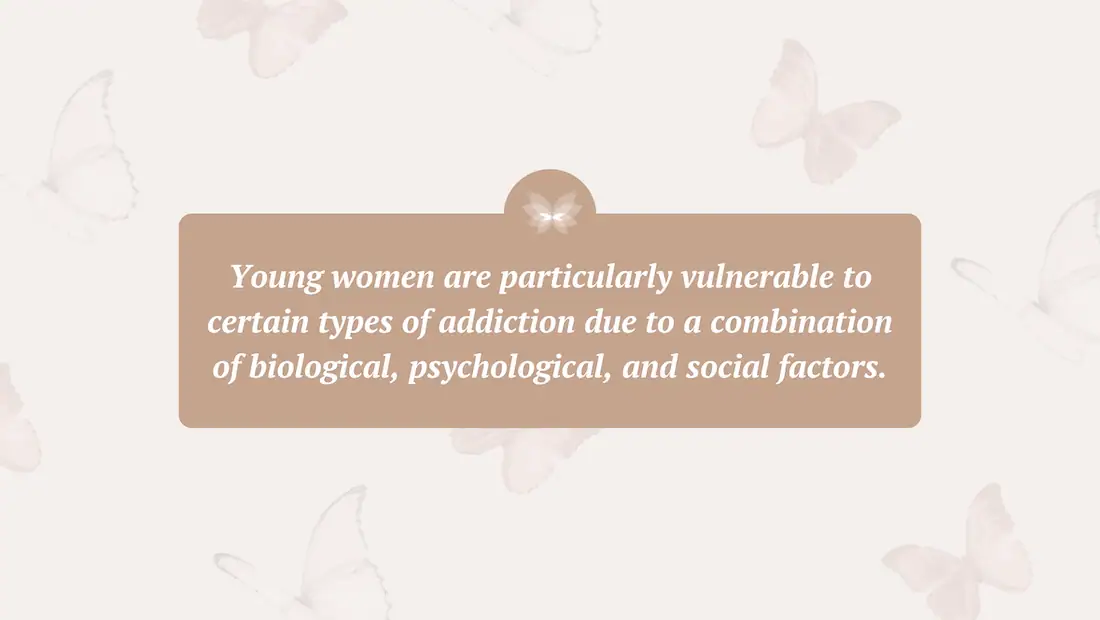Being a young woman in our culture is challenging. Society places pressure on young women, sometimes separating them from their felt sense of connection with themselves. These expectations, along with trauma, mental health conditions, and biological factors, can influence how and why women develop addictions.
At Worthy Wellness, we treat the most common addictions for women by addressing the leading reasons behind these dependencies and providing the most effective treatment methods. Our approach is based on hard evidence, but we also understand the importance of empathy, support, and holistic solutions to empower women in overcoming these challenges.
No matter the cause or reason for addiction, the right support can help young women take back control of their lives.
Understanding Addiction In Young Women
Addiction is a multifaceted issue that affects individuals regardless of age, gender, or background. However, young women face unique challenges and triggers that can lead to addictive behaviors. For example, while women are more likely to use substances to self-medicate, they are less likely to be diagnosed with substance abuse disorders than men.
The biological differences in women also make addiction develop more rapidly. The most common substance addictions are more dangerous in women, as their bodies process drugs and alcohol at a slower rate than men. Understanding these specific factors is crucial for addressing and treating addiction in women effectively.
What Are The Most Common Addictions Among Young Women?
Alcohol Addiction: Alcohol, the most common addiction in America, is also one of the most prevalent addictions among young women. Normalization of binge drinking, social pressures, and the influence of media often contribute to the development of alcohol dependence.
Prescription Drug Misuse: Prescription drugs such as opioids and sedatives are increasingly common addictions among young women. Factors such as easy accessibility and self-medication for mental health issues often lead to misuse and addiction.
Eating Disorders: While not always recognized as an addiction, eating disorders like anorexia and bulimia stem from an addictive pattern of behavior and thought. Eating disorders and disordered eating patterns are some of the most common addictions for women. For example, women make up three-fourths of people with anorexia. These disorders often arise from societal pressure to conform to certain body standards.
Nicotine Dependence: The rise in vaping has led to nicotine becoming one of the most common addictions in youth, especially young women. The misconception of vaping as a safer alternative to smoking contributes to its popularity.
Social Media and Technology Addiction: In the digital age, addiction to social media and technology is an emerging concern. This addiction often stems from the need for social validation and “fear of missing out”. Some research suggests that women are more sensitive to the dopamine reward that makes social media addictive, and therefore more susceptible to dependency.
Why Are Young Women Vulnerable To Certain Types Of Addiction?
Young women are particularly vulnerable to certain types of addiction due to a combination of biological, psychological, and social factors:
- Biologically, women often experience more intense drug cravings and may become dependent on substances more quickly than men. Hormonal fluctuations can also influence susceptibility to addiction. Nicotine, one of the most common addictions in women, is thought to be attributed to the influence of the female hormones estrogen and progesterone.
- Psychologically, young women frequently face unique stressors and mental health challenges, such as higher rates of depression and anxiety, which can lead to substance use as a coping mechanism.
- Socially, young women are often subjected to intense peer pressure and societal expectations, especially regarding body image and social behaviors. These factors can cause women to turn to substances like alcohol, prescription drugs, and illicit drugs to cope with the stress.
Women also play roles in their families that can interfere with their ability to seek help. For example, mothers struggling with addiction may be afraid to admit their problem out of fear of losing custody of their children.
Common Misconceptions About Addiction In Women
There are several misconceptions about addiction in women that often hinder both identifying common signs of addiction in women and providing effective treatment. One widespread myth is that addiction is a choice or a moral failing, rather than a complex medical condition. This viewpoint neglects the complicated and nuanced physical, social, and psychological factors that often lead to addiction in women.
Another common misconception is that women are less prone to addiction than men. In reality, women may become addicted differently and sometimes more quickly than men due to biological and hormonal differences.
Furthermore, the stigma surrounding women with addiction can be more pronounced, leading to shame and a reluctance to seek help. It’s crucial to dispel these myths to foster a more empathetic and effective approach to treating addiction in women.
Can Addiction In Young Women Be Prevented?
Preventing addiction in young women is achievable through targeted education, early intervention, and supportive environments. Educating young women about their gender-specific risks of substance abuse and offering early intervention for those at risk can encourage people to seek care earlier in their addiction cycle. Research has also shown the importance of supportive home and community environments to prevent and treat the most common addictions in young women. Effective treatment measures also focus on promoting healthy coping mechanisms, open communication, and self-esteem-building activities. By giving women the necessary tools and support, their likelihood of developing an addiction can drop significantly.
Treatment And Recovery Strategies For Addiction In Women
Addressing addiction in young women requires a compassionate and multifaceted approach. Here are some effective strategies:
Professional Counseling and Therapy: Therapy, particularly cognitive-behavioral therapy (CBT), can help young women address the underlying causes of their addiction and develop coping strategies to positively overcome their challenges.
Medication-Assisted Treatment (MAT): In severe cases, medications can be used in conjunction with therapy to ease withdrawal symptoms and cravings.
Support Groups and Community Resources: Groups like Alcoholics Anonymous (AA) or Narcotics Anonymous (NA) can provide valuable social support and a sense of community.
Lifestyle Changes: A healthy lifestyle, including regular exercise, a balanced diet, and mindfulness practices, can support recovery.
Family Therapy and Support: Involving family members in the recovery process can help young women repair their strained relationships and strengthen their social support network.
At Worthy Wellness Center, we offer specialized drug and alcohol addiction treatment programs that incorporate these strategies to support the recovery journey of young women battling addiction.
Empowering Recovery: A Path Forward For Young Women
Understanding the root cause of addiction in young women is a vital step towards a healthier, more fulfilling life. At Worthy Wellness Center, we believe in the power of education, compassion, and professional support in overcoming these challenges.
If you or someone you know is struggling with addiction, reach out to us for help, guidance, and support. Remember: you don’t have to do it alone. You’ll be amazed at how much can change.





